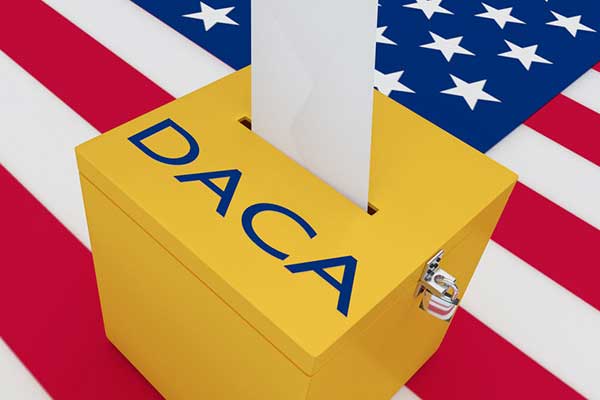Blog

Trusted Northwest Suburban Law Firm
847-944-9400
DACA began under President Barack Obama in 2012 and gives young people who were brought to the U.S. illegally as children the ability to stay in the country for two-year, renewable periods without being deported. These young immigrants who seek protection from deportation under DACA are known as Dreamers and there are approximately 700,000 people with active DACA status in the country.
The court ruling was 5-4. That means that eligible DACA recipients will continue to be protected from deportation and eligible to receive benefits under the program, like work authorization.
What did the Court say?
The majority opinion was written by Chief Justice John Roberts and joined by Justices Ruth Bader Ginsburg, Elena Kagan, and Stephen Breyer. Justice Sonia Sotomayor also joined the majority opinion in all but one section. The ruling rejects the Trump administration’s rationale that DACA was unreviewable under the Administrative Procedure Act, or APA. Instead, the Court states that cancelling the program is “arbitrary and capricious” and in violation of federal law. The ruling emphasizes that the administration failed to provide an adequate reason to justify ending the DACA program.
“We do not decide whether DACA or its rescission are sound policies,” Roberts wrote. “We address only whether the agency complied with the procedural requirement to provide a reasoned explanation for its action. Here the agency failed to consider the conspicuous issues of whether to retain forbearance and what, if anything, to do about the hardship to DACA recipients. That dual failure raises doubts about whether the agency appreciated the scope of its discretion or exercised that discretion in a reasonable manner.”
The Court faulted the administration and the Department of Homeland Security (DHS) for ignoring “conspicuous issues” of “hardship” that ending DACA would have on recipients, especially those serving in the U.S. military, undergoing medical treatments, or studying in school. The administration also failed to consider deferment, despite the word being in the program’s name.
In dissent, Justice Clarence Thomas said the court was making a huge mistake. Thomas wrote that Congress, not the courts, should enact a solution for the Dreamers. “Today’s decision must be recognized for what it is: an effort to avoid a politically controversial, but legally correct decision,” Justice Thomas wrote. “The Court could have made clear that the solution respondents seek must come from the legislative branch.”
Is the DACA program permanent?
The easy answer: no one knows. This 2020 DACA decision does not rule out future attempts to terminate the DACA program or provide a permanent pathway to citizenship.
Neither party to the suit questioned whether the President has the power to end DACA. Instead, they questioned how he chose to end the program. The Court made it clear that they were only ruling on the narrow issue before them (i.e, whether the cancellation of DACA was arbitrary and capricious), which leaves the door open for the administration to attempt to cancel the program in the future.
“The dispute before the court is not whether DHS may rescind DACA,” Roberts wrote. “All parties agree that it may. The dispute is instead primarily about the procedure the agency followed in doing so.”
The DHS failed to “provide a reasoned explanation” for its decision, a violation of the Administrative Procedure Act,” Roberts said. The DHS will now have to “consider the problem anew.”
Can you still apply for DACA?
YES, the U.S. Citizenship and Immigration Services (USCIS) is currently accepting new applications and renewal applications!
If you are renewing your DACA application, you must do so no later than one year after your DACA expires. Nevertheless, USCIS advises that applicants file their DACA renewal applications between 120 and 150 days prior to the expiration period. Note, USCIS has an unprecedented backlog of applications, and they do not accept DACA applications prior to 150 days before the expiration period.
If you qualify for DACA but have never applied for it before, or are renewing your DACA grant, it is important to consult an immigration attorney to assist with the application process. At Gardi, Haught, Fischer & Bhosale LTD, we feel it is important to understand your case, address your needs, review your eligibility requirements for different programs, and evaluate more permanent immigration options in line with the 2020 DACA decision.
Call Gardi, Haught, Fischer & Bhosale LTD today at 847-944-9400 for a free consultation or fill out our form by clicking on our free case evaluation button below.
